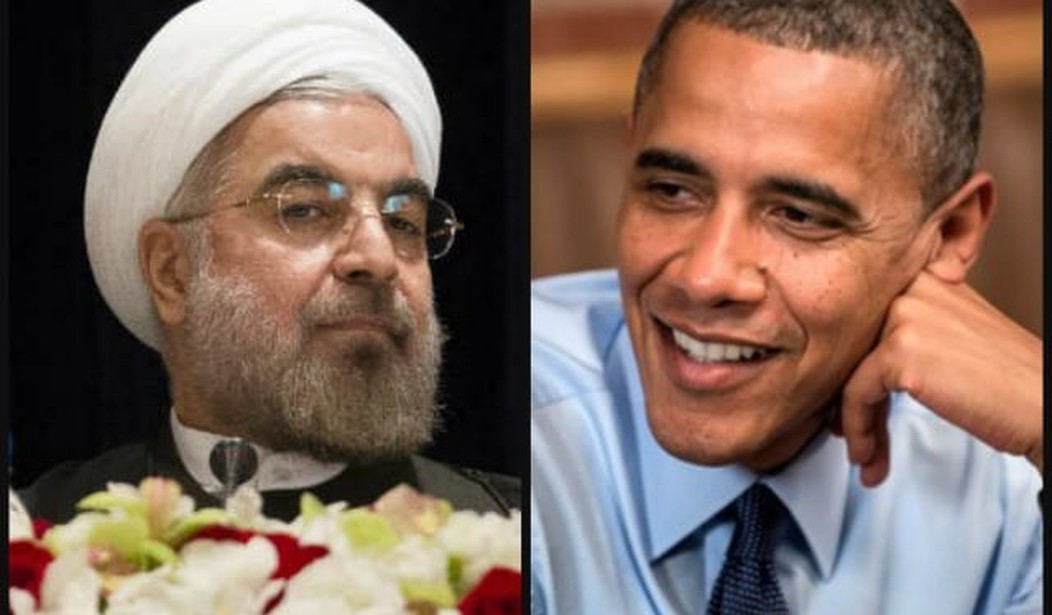WASHINGTON — At first blush, today’s announcement by Senate Democrats that they don’t want to vote on Iran sanctions legislation until late March may seem like a victory for the Obama administration as it lobbies lawmakers to back off.
But the delay allows a coalescing of forces in Congress, an important visit from the Israeli prime minister, and a legislative effort to fight back against the White House’s refusal to treat a nuclear deal like a treaty.
There is the danger of the White House, wanting to rush before they know legislation will come to the floor, forcing through an agreement chock full of concessions to the Islamic Republic, but they also may just be looking to buy more time. House Foreign Affairs Committee Chairman Ed Royce (R-Calif.) said at a hearing this morning that a senior official noted the administration is already weighing an extension of talks again at the summer deadline.
Royce added that talks currently appear to be “stalemated” but are inching “closer and closer” toward Iran’s position.
“This is a regime that is playing for keeps,” he said. “Yet sometimes it seems the administration is more concerned about Congress moving on sanctions than pressuring its treacherous and deadly negotiating partner.”
Democratic supporters of the Menendez-Kirk sanctions bill told President Obama in a letter that the landscape isn’t looking good.
“We remain deeply skeptical that Iran is committed to making the concessions required to demonstrate to the world that its nuclear program is exclusively peaceful by March 24 – the deadline agreed upon for a political framework agreement. Considering Iran’s history in nuclear negotiations and after two extensions of the Joint Plan of Action, we are concerned that Iran is intentionally extending the negotiations to improve its leverage at the negotiating table,” wrote Sens. Robert Menendez (D-N.J.), Chuck Schumer (D-N.Y.), Richard Blumenthal (D-Conn.), Gary Peters (D-Mich.), Bob Casey (D-Pa.), Ben Cardin (D-Md.), Chris Coons (D-Del.), Joe Manchin (D-W.Va.), Joe Donnelly (D-Ind.), and Debbie Stabenow (D-Mich.).
“We are Democratic supporters of the Iran Nuclear Weapon Free Act of 2015 – a bill that would impose sanctions on Iran only if Iran fails to reach a comprehensive agreement by the June 30 deadline,” they wrote. “This bill also includes monthly waivers after June 30 to provide additional negotiating flexibility. We believe that this bill, as introduced, is reasonable and pragmatic, respects the nuclear negotiating timeline, and sends a strong signal to Iran and to the international community that endless negotiations under the interim agreement are dangerous, unacceptable, and could leave Iran with a threshold nuclear weapon capability.”
At a Senate Banking Committee hearing today, Schumer called the sanctions bill “irrefutable logic.”
The Dems told Obama that they would not vote on the bill until March 24.
“After March 24, we will only vote for this legislation on the Senate floor if Iran fails to reach agreement on a political framework that addresses all parameters of a comprehensive agreement,” the senators continued. “This deadline is the critical test of Iranian intentions. We expect that your Administration will consult closely with members of Congress in the coming months, and look forward to working with you to achieve our shared goal of reversing Iran’s ability to develop a nuclear weapon capability.”
The administration has set a June 30 deadline for an agreement with Iran, and has consistently drawn complaints from members of Congress through two deadline extensions that lawmakers have been left out of the loop.
At the Foreign Affairs Committee, Rep. Brad Sherman (D-Calif.) stressed “the fact is Iran has a July 1 program, they just haven’t had to publish it because they don’t have an open society where they have to make decisions in public; we ought to have a July 1 program ready to go and in order to do that Congress has to actually vote on a bill” — respective references to Iran’s nuclear program and the U.S. sanctions regime.
Menendez explained at the Banking Committee hearing today that the sanctions can’t just be turned on like the White House contends Congress can do if and when talks fail. It takes six months for sanctions to go into effect and more time to “feel a consequence,” and “the Iranian ability to pass the nuclear threshold is well below the six months.”
“The fact is that negotiators are now in their 18th month of talking. And senior administration officials continue to forecast the chance of reaching an agreement at less than 50-50,” Menendez said. “In the interim, Iran has breached the Joint Plan of Action at least once and made a mockery of it a second time by trying to illicitly procure parts for the Arak reactor in violation of U.N. Security Council resolutions.”
“Iran is procrastinating because the longer the negotiations last, the further the P5 moves in their direction. We have slowly shifted positions during the last 18 months after dismantling Iran’s nuclear infrastructure, the Arak reactor, the Fordow enrichment facility, Iran’s 19,000 centrifuges to allow Iran to keep all those elements in some form, while we settle for alarm bells that will tell us only when it’s too late.”
The senator added that he “can’t begin to understand how we would build an inspection and verification regime or how long the agreement must last until we know how far they’ve come towards building a nuclear weapon.”
“What I don’t want to see, and what I will not submit to is having the aspirations that we had in North Korea, which ended up not turning into the aspirations we desired, but turning up into North Korea being a nuclear weapons state, for which we are paying enormously today,” he said. “And that is a test of history in judgment that those who supported that at that time, I think, will come to regret, as well, should come to regret as well.”
The Menendez-Kirk bill is expected to be marked up at the Banking Committee on Thursday, and an aide told The Hill that Menendez will vote for his legislation at that level.
Senate Majority Leader Mitch McConnell (R-Ky.) told reporters today that after the sanctions bill comes out of committee “it will be on the calendar and we’ll make a decision later about the actual timing of it.”
As Senate Foreign Relations Committee Chairman Bob Corker (R-Tenn.) stressed, though, “the last thing we need to do is pass a bill out of the United States Senate that is not veto-proof.”
And the delay could be just the thing Menendez-Kirk needs to ensure that security.
First, a March Senate vote would come after what is promising to be an epic address by Israeli Prime Minister Benjamin Netanyahu before a joint session of Congress.
At Yad Vashem today for Holocaust Remembrance Day, Netanyahu called it his responsibility “to see to it that there will not be a reason to build additional memorial sites such as Yad Vashem.”
“The pending agreement with Iran is an agreement that endangers the State of Israel. It leaves Iran with the capabilities that will allow it to arm itself with nuclear weapons, one bomb at first and afterwards many atomic bombs. We cannot live with such an agreement; therefore, we oppose it,” Netanyahu said.
“Even those who try to challenge us within our borders will discover that we are ready to respond with force. Israel views with utmost gravity the attack against it from Syrian territory. Those who play with fire will get burned.”
Netanyahu was originally asked by House Speaker John Boehner (R-Ohio) to address Congress on Feb. 11, the anniversary of the 1979 Islamic Revolution. Instead he’ll give his speech on March 3, a key date for another reason.
That coincides with the American Israel Public Affairs Committee mega-conference in D.C., the second factor working against the White House.
Netanyahu will speak at AIPAC, which is generally attended by more than two-thirds of lawmakers on the Hill. But the crux of the conference is lobbying — on the day that the prime minister speaks, many of the estimated 14,000 attendees will flood congressional offices afterward for lobbying appointments.
Plus, after Obama accused Menendez and other national security Dems of pushing the sanctions legislation because of pressure from “donors” — read, pro-Israel groups — the temperature of the conference should be cooler to the administration than ever.
Boehner again defended the invitation to Netanyahu today. “The House of Representatives is an equal branch of the government,” he said. “We have a right to do it and we did it.”
As there are some different proposals and amendments floating around the Hill for the Iran sanctions legislation, a weeks-long delay allows time for intra-Congress negotiations on a final bill. But — the third thing working against the administration’s game plan — it also allows time for Congress to move on the elephant in the negotiating room: the “treaty” semantics.
White House press secretary Josh Earnest on Friday stressed the administration’s point of view that Congress’ approval of an Iran deal is neither desired nor required because it’s “an agreement and it’s not a treaty.”
The ratification movement is gathering steam.
“The Obama administration — if an agreement is reached, it’s going to happen with only 18 months left in this administration. Our national security interest in preventing Iran from having nuclear weapons will extend far beyond the remainder of this administration’s term,” Sen. Pat Toomey (R-Pa.) said at the Banking Committee today.
“So Congress should vote on the agreement just as the Senate would ratify any important treaty. And the Iranian people need to know that they are negotiating with the American people and have the broad support of Congress, rather than just the president.”
There’s already a bill for that, first introduced back in July by Sens. Lindsey Graham (R-S.C.) and Corker. And it’s returning in a new form for the 114th Congress.
The Iran Nuclear Negotiations Act would require the administration to submit to Congress any comprehensive nuclear agreement with Iran for a 60-day review period, allowing time for hearings on the deal.
The agreement would be subject to a vote of approval, a vote of disapproval, or a decision to not take a vote, which would be tantamount to approval.
The bill would treat the Iran negotiations like 123 Agreements, which “establish the legal framework for significant nuclear cooperation with other countries,” according to the Nuclear National Security Administration. Among the two dozen such agreements that have passed through Congress are pacts with Russia, Egypt and Turkey.
Corker noted today that one of his first votes was on the 123 Agreement with India that was inked under President Bush. “And yet, the administration is telling us today that they do not want us to weigh in on this agreement,” he said.
The bill would also reimpose all sanctions upon verification that Iran has cheated on the deal or if the administration tries to extend the negotiation deadline again.
At the Foreign Affairs Committee, Sherman stressed that Congress has “the co-decision making responsibility.”
“It is inaccurate, as some have said, to say that [the interim Joint Plan of Action] has halted their program,” Sherman said. “The centrifuges continue to turn, they build their stockpile of 3.5 percent enriched uranium… Iran is a little further away from their first bomb, or at least having highly enriched uranium for it, but is getting closer every day to their sixth, seventh, or eighth bomb as they continue to build an increasingly large stockpile of low-enriched uranium.”









Join the conversation as a VIP Member